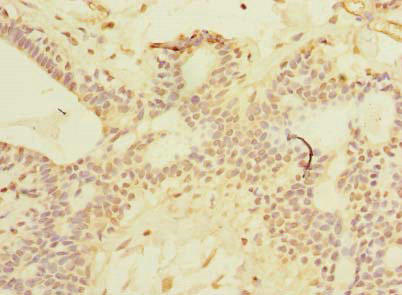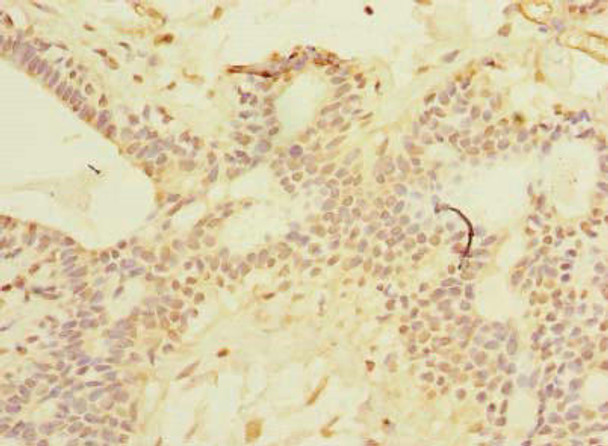SCNM1 Antibody (PACO29764)
- SKU:
- PACO29764
- Product Type:
- Antibody
- Reactivity:
- Human
- Host Species:
- Rabbit
- Isotype:
- IgG
- Applications:
- ELISA
- IHC
- Antibody Type:
- Polyclonal Antibody
- Conjugation:
- Unconjugated
Frequently bought together:
Description
| Antibody Name: | SCNM1 Antibody (PACO29764) |
| Antibody SKU: | PACO29764 |
| Size: | 50ug |
| Host Species: | Rabbit |
| Tested Applications: | ELISA, IHC |
| Recommended Dilutions: | ELISA:1:2000-1:10000, IHC:1:20-1:200 |
| Species Reactivity: | Human |
| Immunogen: | Recombinant Human Sodium channel modifier 1 protein (1-230AA) |
| Form: | Liquid |
| Storage Buffer: | Preservative: 0.03% Proclin 300 Constituents: 50% Glycerol, 0.01M PBS, PH 7.4 |
| Purification Method: | >95%, Protein G purified |
| Clonality: | Polyclonal |
| Isotype: | IgG |
| Conjugate: | Non-conjugated |
 | Immunohistochemistry of paraffin-embedded human breast cancer using PACO29764 at dilution of 1:100. |
| Background: | Plays a role in RNA splicing, possibly contributing to the recognition of non-consensus donor sites. |
| Synonyms: | Sodium channel modifier 1, SCNM1 |
| UniProt Protein Function: | Plays a role in RNA splicing, possibly contributing to the recognition of non-consensus donor sites. |
| UniProt Protein Details: | |
| NCBI Summary: | This locus represents naturally occurring read-through transcription between the neighboring TNFAIP8L2 (tumor necrosis factor, alpha-induced protein 8-like 2) and SCNM1 (sodium channel modifier 1) genes on chromosome 1. The protein-coding read-through transcript variant encodes a protein that shares sequence identity with the downstream gene product but its N-terminal region is shorter due to alternate exon use relative to the downstream gene. [provided by RefSeq, Dec 2016] |
| UniProt Code: | Q9BWG6 |
| NCBI GenInfo Identifier: | 325651996 |
| NCBI Gene ID: | 100534012 |
| NCBI Accession: | NP_001191777.1 |
| UniProt Secondary Accession: | Q9BWG6,Q5JR74, B4DWR1 |
| UniProt Related Accession: | Q9BWG6 |
| Molecular Weight: | Observed: 26 kDaPredicted: 26 kDa |
| NCBI Full Name: | TNFAIP8L2-SCNM1 protein |
| NCBI Synonym Full Names: | |
| NCBI Official Symbol: | TNFAIP8L2-SCNM1 |
| NCBI Official Synonym Symbols: | SCNM1 |
| NCBI Protein Information: | TNFAIP8L2-SCNM1 protein |
| UniProt Protein Name: | Sodium channel modifier 1 |
| UniProt Synonym Protein Names: | |
| Protein Family: | Sodium channel modifier |
| UniProt Gene Name: | SCNM1 |
| UniProt Entry Name: |
| Antibodies |
| SCNM1 Antibody (PACO12056) |
| Secondary Antibody |
| Anti-HRP Goat Anti-Rabbit IgG (H+L) Antibody (CABS014) |
| Recommended Products |
| Anti-FITC Goat Anti-Rabbit IgG (H+L) Antibody (CABS011) |
| Anti-HRP-conjugated Beta Actin Antibody (CABC028) |


